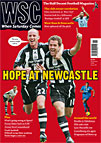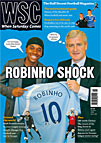 Dear WSC
Dear WSC
I write to you concerning Simon Creasey’s fascinating article Parting Shots (WSC 259), in which Ignacio Palacios-Huerta of the London School of Economics describes that, in penalty shootouts, the team that taking a penalty first wins 60.5 per cent of the time. He then goes on to say that the team kicking first “has a 21 per cent greater probability of winning the shootout”. I don’t cast doubt on Mr Palacios-Huerta’s abilities as a statistician, but it is possible that he meant 21 per cent more probability of winning. If Team X has a 60.5 per cent probability of winning, then Team Y therefore has a 39.5 per cent probability. Team X’s probability is [(((60.5 / 39.5) -1) x 100) =] 53 per cent greater than Team Y’s of winning the shootout. Or, in other words, that Team X wins 21 per cent more matches means that their chances are 53 per cent better than Team Y’s for any given shootout. We can be sure that this is precisely what was going through Rio Ferdinand’s head after extra time in Moscow.
Patrick Finch, Eskilstuna, Sweden
Search: 'shirts'
Stories
 Directors of football are a little-loved breed. Paul Joyce looks at changing attitudes in Germany, where despite successes many clubs now have doubts
Directors of football are a little-loved breed. Paul Joyce looks at changing attitudes in Germany, where despite successes many clubs now have doubts
Kevin Keegan is hardly unfamiliar with outside interference in managerial affairs. His move to Hamburger SV in May 1977 was engineered by one of the Bundesliga’s first general managers, Dr Peter Krohn. A football layman who saw sport as “show business”, Krohn changed HSV’s blue shirts to pink to attract female customers and made the team ride into the stadium on elephants. Viewing himself as more important in the club hierarchy than “overvalued” coaches with “insufficient school education”, Krohn’s meddling meant that HSV finished only tenth in Keegan’s first season.
 Newcastle, managerless and looking for new ownership, travel to a seemingly far happier club, with West Ham fans welcoming Gianfranco Zola. But fresh turmoil is about to emerge: the papers reporting on the game predict the imminent verdict in Sheffield United’s appeal over Carlos Tevez, writes David Stubbs
Newcastle, managerless and looking for new ownership, travel to a seemingly far happier club, with West Ham fans welcoming Gianfranco Zola. But fresh turmoil is about to emerge: the papers reporting on the game predict the imminent verdict in Sheffield United’s appeal over Carlos Tevez, writes David Stubbs
I caught this fixture in April, on an unseasonably warm day. The Jubilee Line was subject to one of its rare closures and I had to make the trip in a replacement bus, which, like a mobile greenhouse and packed to the rafters, wended its way at gridlocked-traffic’s pace to Canning Town, then past some of east London’s most eye-catching industrial estates before reaching West Ham. Uncannily, though the journey lasted 40 minutes, the Millennium Dome hovered throughout, seemingly never more than 250 yards away; a curse of the white elephant. West Ham, under the lugubrious watch of Alan Curbishley, darted into a 2-0 lead but then, having blown their bubbles, conceded two quick goals to a Newcastle team with the air of having accidentally rediscovered their self-esteem under Kevin Keegan.
 Owning a football club is now officially beyond the wildest dreams. Even Harry Pearson's
Owning a football club is now officially beyond the wildest dreams. Even Harry Pearson's
When they reach their forties, men experience a change. You begin to suspect that the manufacturers of jeans have started skimping on material, you meet young people (yes, you have started to use the phrase “young people”) that you assume are sixth-formers and when you ask politely what A-levels they are doing discover that in fact they are GPs, barristers or your new boss, and you feel strangely compelled to tell your children not to keep saying like, like all the, like, time, for goodness sake because “you’re hardly going to impress a prospective employer speaking like that”.
 Brazil’s quest for Olympic glory fell short once more, adding to the pressure on Dunga in the World Cup, writes Robert Shaw
Brazil’s quest for Olympic glory fell short once more, adding to the pressure on Dunga in the World Cup, writes Robert Shaw
A new film called 1958 – The Year in Which The World Discovered Brazil has the team fondly recalling how the blue shirts worn to beat Sweden in the World Cup final were hurriedly bought at a local shop. The badge of the football federation was then stitched on. Fifty years on and Brazil’s Olympic team turn up to collect their bronze medals with sticking plasters over offending badges – the full national football team wear Nike shirts, while Olympikus sponsor the Olympic team,